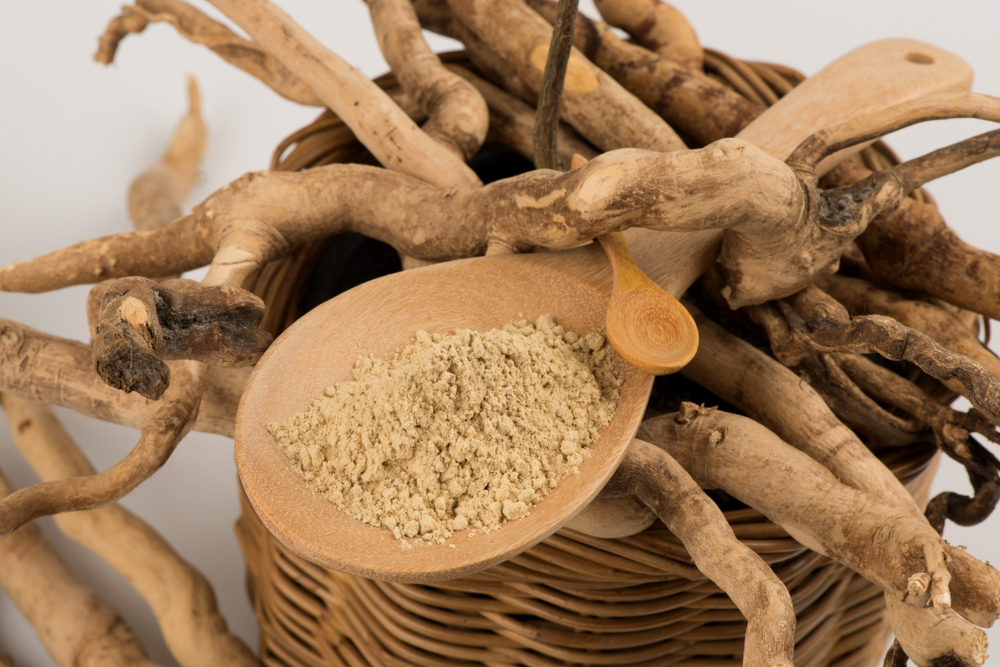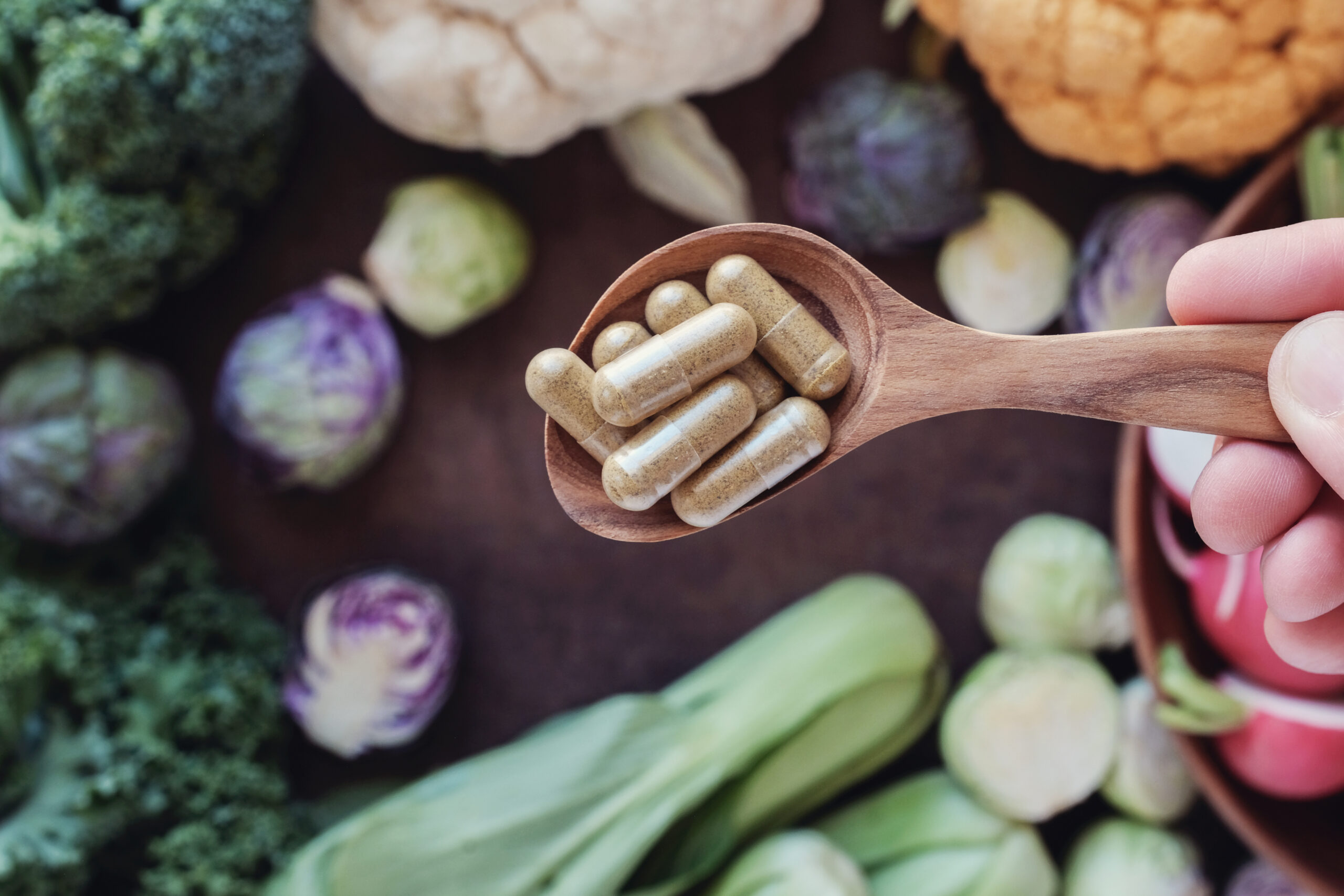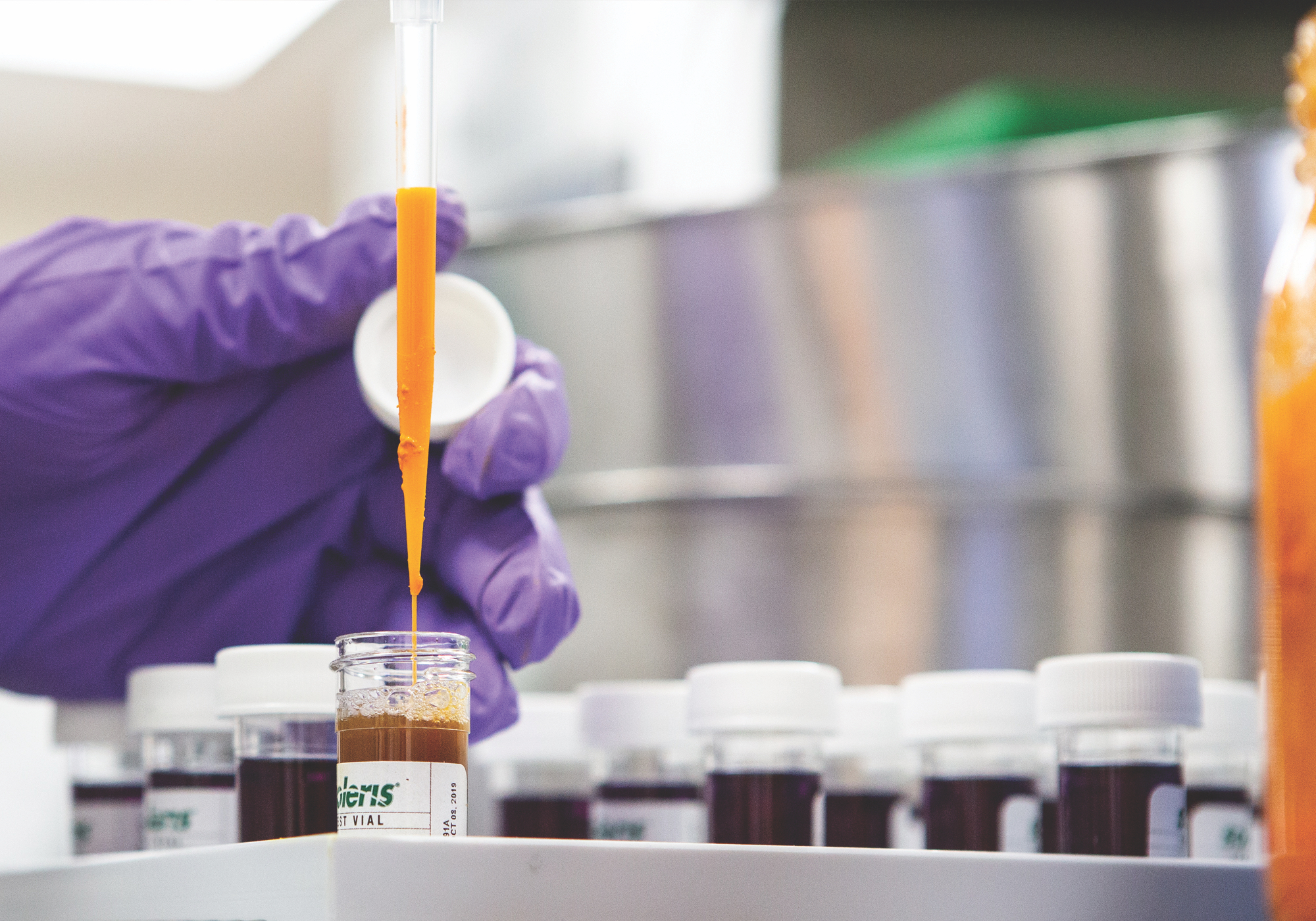Scientific name:Eurycoma longifolia Common name:Tongkat Ali, Longjack, Malaysian Ginseng
Constituents:1-3
- Quassinoids (nortriterpenoids): primarily eurycomanone and others
- Alkaloids (β-carboline, canthin-6-one)
- Tirucallane and squalene-type triterpenes
- Polypeptides (eurypeptides)
- Polyphenolics
Medicinal Actions:
- Adaptogen
- Aphrodisiac
- Bitter
- Reproductive Tonic
- Tonic
Traditional Use:4-6
- A tree native to Southeastern Asia (e.g. Indonesia, Malaysia, Vietnam, Cambodia, Myanmar, Laos and Thailand) with decades of traditional medicinal use.
- Several parts of the plant have used in traditional folk medicine but most commonly the root has been used as a tonic during illness, an aphrodisiac for sexual dysfunction, to increase strength and energy, provide anti-aging effects, reduce stress & anxiety, improve exercise recovery, lower blood pressure, treat malaria, parasites, fever, cancer, diabetes, rheumatism, constipation, syphilis, sore throat, tonsillitis/glandular swelling, and skin diseases such as leprosy.
Evidence Based Use:
- Findings from clinical research have primarily been conducted using a standardized water extract of longifolia root.
- Both animal and human trials have reported enhancement in male fertility parameters including libido, erectile dysfunction, higher semen volumes, spermatozoa count and motility, particularly in testosterone-deficient idiopathic males.7-10
- Has been shown to increase testosterone concentrations in animals, and exert pro-androgenic effects that enhance free and total testosterone levels in both males and females.11-13
- Extract has been shown to improve symptoms of late-onset hypogonadism and testosterone deficiency syndrome in males, helping to restore serum testosterone concentrations and manage associated symptoms such as low libido, fatigue, increased fat mass, osteoporosis and erectile dysfunction, and improve overall physical and sexual health.14-17
- Has been shown to improve stress hormone profiles and mood state parameters in both men and women under moderate stress, and have anxiolytic properties in mice.18,19
Mechanism of Action + Pharmacology:
- Quassinoids are a group of nortriterpenoids (degraded triterpene lactones) with diverse pharmacological properties. A major quassinoid found in the root of Tongkat Ali is eurycomanone, which has been shown to increase testosterone production in testicular Leydig’s cells in rats and is suggested to affect the hypothalamic-pituitary gonadal axis, inhibit aromatase conversion of testosterone to estrogen, free bound testosterone, and possibly be involved in phosphodiesterase inhibition and have anti-estrogenic effects.20-24
- Other constituents such as alkaloids and triterpenes act as antioxidants and may play an important role in counteracting oxidative stress and reducing bone loss.25,26
- Polypeptides (eurypeptides) are known to have improve energy status and sex drive in animal studies and may enhance the biosynthesis of various androgens.27-29 Eurypeptides may also work by stimulating dihydroepiandosterone (DHEA) and alleviate sex-hormone binding globulin (SHBG), thus subsequently increasing free testosterone levels.30,31
- Note: Effects on restoring normal testosterone levels appear to be less due to “stimulating” testosterone synthesis, but rather by increasing the release rate of “free” testosterone from SHBG. Thus should not be considered a testosterone “booster” but rather a “maintainer” of normal testosterone levels and a “restorer” of normal testosterone levels from “low” to normal ranges.32
Safety + Toxicity Concerns:
- No known contraindications or adverse reactions expected at standard doses.
- Use caution in persons under 18 years of age, pregnant and lactating women, and in use over 6 months due to a lack of sufficient safety data.
Interactions:
- May decrease the bioavailability of propranolol.33
- Use caution with insulin and hypoglycemics due to theoretical additive effects.
References
- Kuo, P. C., et al. (2004). Cytotoxic and antimalarial constituents from the roots of Eurycoma longifolia. Bioorganic & medicinal chemistry, 12(3), 537-544.
- Sobri, H., et al. (2007). A summary of reported chemical constituents and medicinal uses of Eurycoma longifolia. Journal of Tropical Medicinal Plants, 8(1), 103-110.
- Morita, H., et al. (1993). Squalene derivatives from Eurycoma longifolia. Phytochemistry, 34(3), 765-771.
- Ang, H. et al. Evaluation of the potency activity of aphrodisiac in Eurycoma longifolia Jack. Phytother. Res. 2001, 15, 435–436
- Hussein, S, et al. K. A summary of reported chemical constituents and medicinal uses of Eurycoma longifolia. J. Trop. Med. Plants 2007, 8, 103–110.
- Rehman, S. et al. (2016). Review on a traditional herbal medicine, Eurycoma longifolia Jack (Tongkat Ali): its traditional uses, chemistry, evidence-based pharmacology and toxicology. Molecules, 21(3), 331.
- Ismail, S.B, et al. Randomized clinical trial on the Use of PHYSTA freeze-dried water extract of Eurycoma longifolia for the improvement of quality of life and sexual well-being in Men. Evid. Based Complement. Altern. Med. 2012
- Chan, K. et al. (2009). The effect of Eurycoma longifolia on sperm quality of male rats. Natural product communications, 4(10).
- Udani, J. K. et al. (2014). Effects of a proprietary freeze-dried water extract of Eurycoma longifolia (Physta) and polygonum minus on sexual performance and well-being in men: a randomized, double-blind, placebo-controlled study. Evidence-Based Complementary and Alternative Medicine, 2014.
- Tambi, M. et al. (2010). Eurycoma longifolia Jack in managing idiopathic male infertility. Asian journal of andrology, 12(3), 376.
- Zanoli, P. et al. of Eurycoma longifolia on the copulatory activity of sexually sluggish and impotent male rats. J. Ethnopharmacol. 2009, 126, 308–313.
- Solomon, M. C. et al. (2014). In vivo effects of Eurycoma longifolia Jack (Tongkat Ali) extract on reproductive functions in the rat. Andrologia, 46(4), 339-348.
- Henkel, R. R. et al. (2014). Tongkat Ali as a potential herbal supplement for physically active male and female seniors—a pilot study. Phytotherapy Research, 28(4), 544-550.
- George, A.; Henkel, R. Phytoandrogenic properties of Eurycoma longifolia as natural alternative to testosterone replacement therapy. Andrologia 2014, 46, 708–721.
- Tambi, M. et al. (2012). Standardised water‐soluble extract of Eurycoma longifolia, Tongkat ali, as testosterone booster for managing men with late‐onset hypogonadism?. Andrologia, 44, 226-230.
- Henkel, R. R. et al. (2014). Tongkat Ali as a potential herbal supplement for physically active male and female seniors—a pilot study. Phytotherapy Research, 28(4), 544-550.
- Shuid, A.N. et al. The anti-osteoporotic effect of Eurycoma longifolia in aged orchidectomised rat model. Aging Male 2011, 14, 150–154.
- Talbott, S. et al. 2013). Effect of Tongkat Ali on stress hormones and psychological mood state in moderately stressed subjects. Journal of the International Society of Sports Nutrition, 10(1), 1-7.
- Ang, H. et al. (1999). Studies on the anxiolytic activity of Eurycoma longifolia Jack roots in mice. The Japanese Journal of Pharmacology, 79(4), 497-500.
- Low, B. S. et al. (2013). Eurycomanone, the major quassinoid in Eurycoma longifolia root extract increases spermatogenesis by inhibiting the activity of phosphodiesterase and aromatase in steroidogenesis. Journal of Ethnopharmacology, 149(1), 201-207.
- Low, B. et al. (2013). Standardized quassinoid-rich Eurycoma longifolia extract improved spermatogenesis and fertility in male rats via the hypothalamic–pituitary–gonadal axis. Journal of Ethnopharmacology, 145(3), 706-714.
- Ulbricht, C. et al. (2013). An evidence-based systematic review of tongkat ali (Eurycoma longifolia) by the natural standard research collaboration. Journal of dietary supplements, 10(1), 54-83.
- Teh, C. H. et al. (2011). Comparative X‐Ray and Conformational Analysis of a New Crystal of 13α, 21-Dihydroeurycomanone with Eurycomanone from Eurycoma longifolia and Their Anti-Estrogenic Activity Using the Uterotrophic Assay. Planta medica, 77(02), 128-132.
- Fiaschetti, G. et al. (2011). Quassinoids: From traditional drugs to new cancer therapeutics. Current medicinal chemistry, 18(3), 316-328.
- Tambi, M. et al. Eurycoma longifolia Jack in managing idiopathic male infertility. Asian J. Androl. 2010, 12, 376–380
- Mohd Effendy, N.,et al. (2012). Eurycoma longifolia: medicinal plant in the prevention and treatment of male osteoporosis due to androgen deficiency. Evidence-based complementary and alternative medicine, 2012.
- Thu, H. E., et al. (2017). Eurycoma Longifolia as a potential adoptogen of male sexual health: a systematic review on clinical studies. Chinese journal of natural medicines, 15(1), 71-80.
- Ang, H. H. et al. (2001). Evaluation of the potency activity of aphrodisiac in Eurycoma longifolia Jack. Phytotherapy Research, 15(5), 435-436.
- Ali, J.; Saad, J. Biochemical Effect of Eurycoma longifolia Jack on the Sexual Behavior, Fertility, Sex Hormone, and Glycolysis. Ph.D. Thesis, University of Malaysia, Kuala Lumpur, Malaysia, 1993.
- Tambi, M. et al. (2012). Standardised water‐soluble extract of Eurycoma longifolia, Tongkat ali, as testosterone booster for managing men with late‐onset hypogonadism?. Andrologia, 44, 226-230.
- Hooi Hoon, A., et al. Effects of Eurycoma longifolia Jack (Tongkat Ali) on the initiation of sexual performance of inexperienced castrated male rats. Exp. Anim. 2000, 49, 35–38.
- Talbott, S. M. et al. (2013). Effect of Tongkat Ali on stress hormones and psychological mood state in moderately stressed subjects. Journal of the International Society of Sports Nutrition, 10(1), 1-7.
- Salman, S. et al. (2010). Modification of propranolol’s bioavailability by Eurycoma longifolia water-based extract. Journal of clinical pharmacy and therapeutics, 35(6), 691–696





